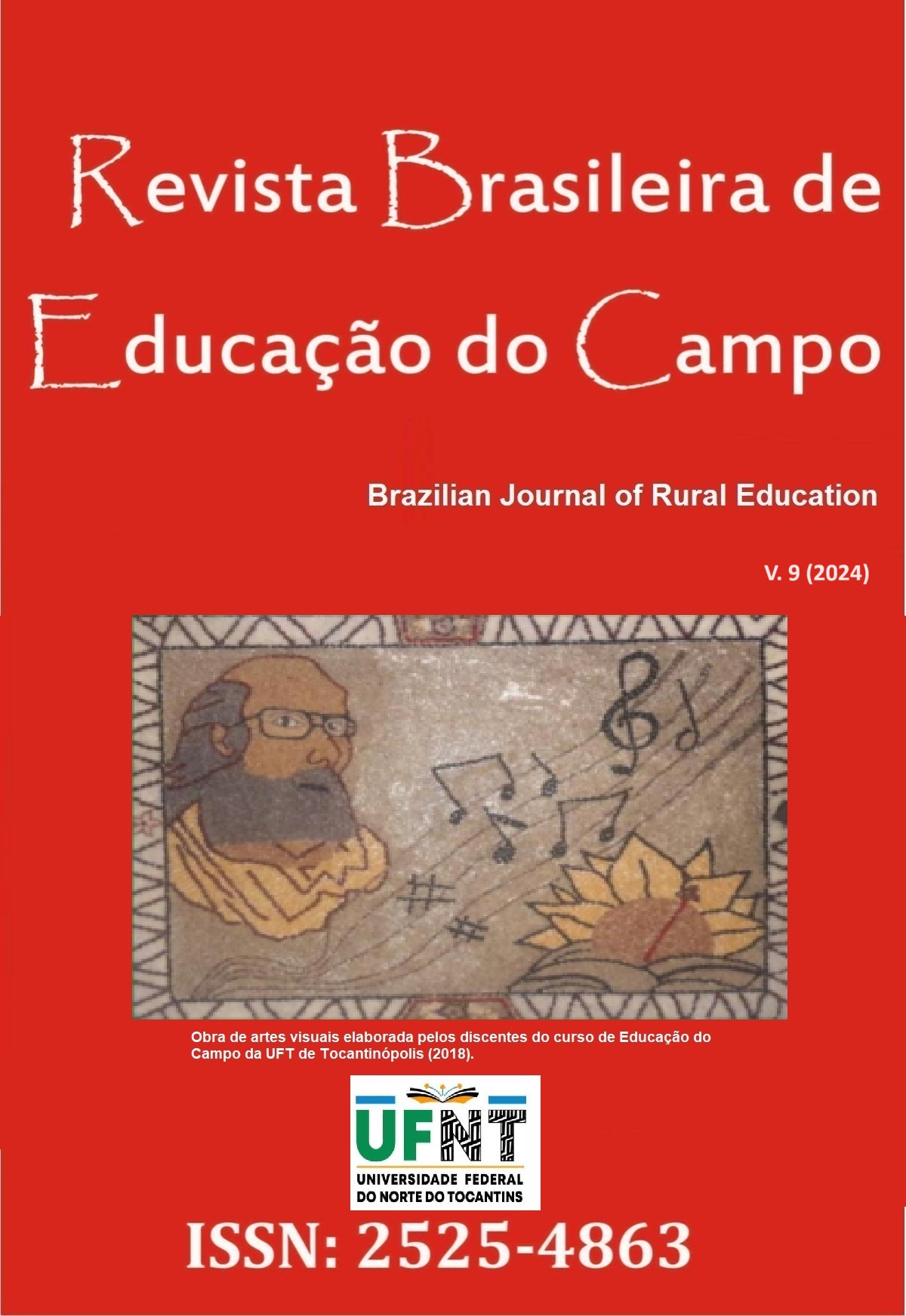Rural, water and forest schools in the Covid-19 pandemic: difficulties and strategies in emergency remote teaching
DOI :
https://doi.org/10.70860/ufnt.rbec.e18524Résumé
This article investigated the difficulties faced by rural, water and forest schools, in different regions of the country, to guarantee access to basic education during the Covid-19 pandemic, as well as analyzing the pedagogical strategies used during emergency remote teaching, with emphasis on the use of social networks. The data were obtained through interinstitutional research entitled Education and rural schools in times of the Covid-19 pandemic, developed between the years 2020-2023. National data were collected through an online questionnaire and interviews via video call. The subjects interviewed were workers from rural schools in 2020. The article uses quantitative data from questionnaires to profile the interviewees and qualitative data from interviews to highlight difficulties and strategies in school practice. Several difficulties in remote teaching were identified, with emphasis on the lack of internet and adequate equipment, compromising access to digital platforms. Other difficulties highlighted are related to the use of the printed materials strategy and the compromising of the teaching and learning process due to the need to carry out remote teaching. Notably, the social networks were used as a support strategy to facilitate “teaching” and learning.
Keywords: remote teaching, rural school, coronavirus pandemic.
Téléchargements
Références
ANDES-SN. (2020). Existe diferença entre o EaD e o ensino remoto?. In ANDES-SN. Projeto do capital para a educação (pp. 12-16). Brasília: Sindicato Nacional.
Freitas, L. C. (2018). A reforma empresarial da educação: nova direita, velhas ideias. São Paulo: Expressão Popular.
Freitas, L. C. (2020, 17 de abril). EAD, tecnologias e finalidades da educação [Blog Avaliação Educacional]. Recuperado de: https://avaliacaoeducacional.com/2020/04/17/ead-tecnologias-e-finalidades-da-educacao/
Janata, N. E., Batista, A. F., Verdério, A., Monaco, G. D. , Gehrke, M. , Gaia, M. C., & de M. ... Finatto, R. A. (2020). Projeto de Pesquisa Educação e escolas do campo em tempos de pandemia da Covid-19. Florianópolis, SC: UFSC.
Medida Provisória nº 934 (2020, 1º de abril). Estabelece normas excepcionais sobre o ano letivo da educação básica e do ensino superior decorrentes das medidas para enfrentamento da situação de emergência de saúde pública de que trata a Lei nº 13.979, de 6 de fevereiro de 2020. Recuperado de: https://www.congressonacional.leg.br/materias/medidas-provisorias/-/mpv/141349#:~:text=Estabelece%20que%20as%20referidas%20dispensas,Fisioterapia%2C%20cumpridas%20as%20condi%C3%A7%C3%B5es%20previstas
Minayo, M. C. S. (2008). O desafio do conhecimento. Pesquisa qualitativa em saúde. São Paulo: Editora Hucitec.
Moraes, A. (2022, 8 de julho). 94% têm conta em alguma rede social; WhatsApp lidera com 92%. Folha de S.Paulo, Recuperado de:
ONU. (2022, 28 de março). Análise da ONU mostra ligação entre falta de equidade de vacinas e aumento da desigualdade. Recuperado de: https://tinyurl.com/2p8kbrba.
Recomendação N° 036 (2020, 11 de maio). Recomenda a implementação de medidas de distanciamento social mais restritivo (lockdown), nos municípios com ocorrência acelerada de novos casos de COVID-19 e com taxa de ocupação dos serviços atingido níveis críticos. Recuperado de: https://conselho.saude.gov.br/recomendacoes-cns/1163-recomendac-a-o-n-036-de-11-de-maio-de-2020#:~:text=Recomenda%20a%20implementa%C3%A7%C3%A3o%20de%20medidas,dos%20servi%C3%A7os%20atingido%20n%C3%ADveis%20cr%C3%ADticos.
Saviani, D., & Galvão, A. C. (2021). Educação na pandemia: a falácia do “ensino” remoto. Universidade & Sociedade, ANDES-SN, XXXI(67), 36-49. Recuperado de: https://www.andes.org.br/img/midias/0e74d85d3ea4a065b283db72641d4ada_1609774477.pdf
Tricontinental. (2020). CoronaChoque: um vírus e o mundo. Instituto Tricontinental de Pesquisa Social, Dossiê nº 28. Recuperado de: https://thetricontinental.org/pt-pt/dossie-28-coronavirus/.
Tricontinental. (2021). Big Techs e os desafios atuais para a luta de classes. Instituto Tricontinental de Pesquisa Social, Dossiê nº 46. Recuperado de: https://thetricontinental.org/wp-content/uploads/2021/11/20211026_Dossier-46_PT_Web.pdf
Téléchargements
Publié-e
Comment citer
Numéro
Rubrique
Licence
© Graziela Del Monaco, Janaine Zdebski da Silva, Antony Josué Corrêa, Valter de Jesus Leite 2024

Cette œuvre est sous licence Creative Commons Attribution 4.0 International.
Proposal for Copyright Notice Creative Commons
1. Policy Proposal to Open Access Journals
Authors who publish with this journal agree to the following terms:
A. Authors retain copyright and grant the journal right of first publication with the work simultaneously licensed under the Creative Commons Attribution License that allows sharing the work with recognition of its initial publication in this journal.
B. Authors are able to take on additional contracts separately, non-exclusive distribution of the version of the paper published in this journal (ex .: publish in institutional repository or as a book), with an acknowledgment of its initial publication in this journal.
C. Authors are permitted and encouraged to post their work online (eg .: in institutional repositories or on their website) at any point before or during the editorial process, as it can lead to productive exchanges, as well as increase the impact and the citation of published work (See the Effect of Open Access).














